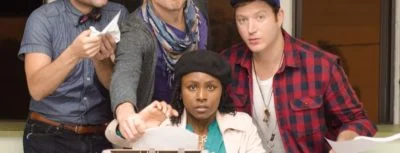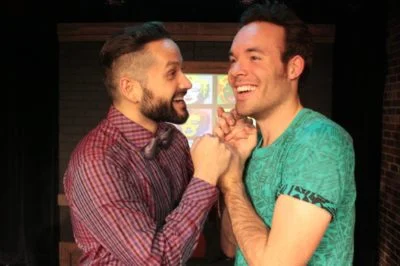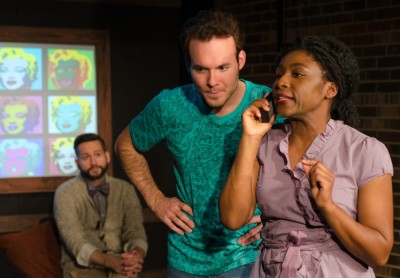The Submission

By Jeff Talbott
Directed by Jude Hansen
Produced by Pride Films & Plays
A Painful Jab at the Theatre Itself
Jeff Talbott’s 2011 play The Submission, now playing at the Apollo, is a story about the hypocrisy of theatre artists. It’s a play sure to stir controversy, but Pride Films & Plays has created a riveting production.
The story begins with Danny (Nicholas Bailey), a struggling gay white playwright (he’s much younger than Talbott, and not an author insert). He’s gotten staged readings a few times over the years, but has never been produced, and is at that point in his late twenties when he has to more seriously consider if his chosen path is worth pursuing. Only now, he’s written a really, really good play. His friend from the playwriting MFA program at Yale, Trevor (Adam Pasen) and husband Pete (Edward Fraim) think it’s his best work ever. The problem is that it’s about an alcoholic black mother living in the projects, and her card-shark son. The liberal theatre establishment would regard this as appropriation, mansplaining, and many other bad things.
So, Danny submits it to the prestigious Humana Festival put on by the Actors Theatre of Louisville under a fake name: Shaleeha G’ntamobi. They agree to produce it. To avoid revealing himself, Danny hires a black actress, Emilie (Ginneh Thomas) to pose as the author. Emilie naturally thinks this is a morally dubious plan, but she’s looking for work, and the play is just too good to let fail. Besides, she and Trevor start a romantic relationship. But as further complications arise from Emilie being placed in the position of a conduit, it turns out that Danny actually is more than a little racist, and Emilie is a downright homophobe. It’s enough to drive Pete to despair of ever understanding theatre people.
Director Jude Hansen has created a cast of all strong actors, but Bailey and Thomas really shine. My sympathy vacillated between them, sometimes as often as with each line. It is hard to be a playwright, and Danny’s story was based off genuine curiosity about other people. That Emilie and the top black artists at the Humana Festival liked it means it must have tapped into some universal human sentiment. And yet, he is terrible to work with, frequently makes offensive statements, and even when he has a point, phrases it in a way that’s needlessly inflammatory. You want to like him, but he makes it so hard. Thomas’s performance is so grounded you think maybe Emilie’s the emerging hero. She clearly loves theatre so much she got emotionally invested in this scheme more than was wise. But she also evades responsibility for her actions and prejudices, takes cheap shots, and tries to turn the friends against each other.
Though the space is small, Hansen makes the most of it. People sitting in the front row may be annoyed to discover those aren’t actually the best site-lines, since some of the action takes place at the Studio’s actual bar far stage-right, but they won’t miss anything. Costume designer Raquel Adorno made some brilliant choices, including putting Danny in an Antoine Dodson t-shirt. The projections (G. Maxin IV) provide a fun taste of what’s to come during the brief set-changes.
The plot is interesting, though it has some problems. Danny and Emilie somehow convince themselves that getting produced at the Humana Festival will put them on the path to fortune. But while they’re both marginal figures in the theatre world, they’re not inexperienced enough to plausibly believe that. Even Pulitzer Prize winners can only expect to be middle-class. The real purpose of this play is the discussion it’s meant to foster among theatre-goers. We’re presented with a conundrum: Danny’s play is supposedly excellent, yet the Humana festival must not have researched “Shaleeha G’ntamobi” at all when accepting it. So was its selection an especially brainless instance of tokenism, as Danny fervently believes, even despite its merit?
Since The Submission was finished in 2011, the focus is all on Danny pretending to be black. Today, the biggest controversy in theatre regarding discrimination vs. tokenism is about women, but Emilie doesn’t talk about gender as much. For dramatic tension, Talbott made both characters bigots, leaving a discussion of the issue entirely on its merits up to the audience. The show is about issues habitual theatre-goers have wanted to see addressed for some time. The character Pete brings up the question of what all this looks like to outsiders. I’m really not sure what someone outside our community would make of this story, but I suspect similar discussions are happening elsewhere. The play is called The Submission, but I doubt anyone will surrender.
Highly Recommended
Jacob Davis
Reviewed October 15, 2014
For more information, visit the show’s page on Theatre in Chicago.
At the Apollo Studio Theatre, 2540 North Lincoln, Chicago. Call 773-935-6100, or visit https://www.apollochicago.com/ for tickets or https://pridearts.org/ for general information. Tickets $25, Runs Sunday at 7:00 pm and Monday and Tuesday at 7:30, except October 20. Runs through November 25. Run time is 2 hours, 10 minutes, with one intermission.



